Rotorua: the Waimangu Volcanic Valley and fantastic adventures in NZ
Wellington was wonderful, we had a good time exploring the lush Botanic Garden. In addition, at the waterfront are nice walks and we loved the great restaurants with stunning water views. Then we did White-water rafting in Turangi.This was a great adventure that we won’t forget. While in Napier, we walked around the town and admired the Art Deco architecture. In Rotorua we enjoyed the hot springs, learned about the Māori and went to the Thermal Parks to see the Geysers. To top it all off, we went White Island to see New Zealand’s most active volcano.
Wellington
We went to windy Wellington, New Zealand’s vibrant capital, four times, and each visit has been a delight. The city’s charm never fades—its compact size makes it easy to explore, yet there’s always something new to discover. We love spending time at the bustling waterfront, where cozy cafes and lively restaurants line the shores. Cuba Street, with its quirky, bohemian vibe, is a must-see.

For us, a trip on the Wellington Cable Car is a must-do. We love the Cable Car ride to the Botanic Garden from where we have stunning views over the city. Walking through the lush garden down to the city is very relaxing.

We love walking along the waterfront, and then enjoy a drink at one of the fantastic restaurants with a great view. The Te Papa Museum is always a highlight, to get an inside of the country’s history and culture.

On one of our visit to Wellington we went to Zealandia a wildlife sanctuary where you can watch the native wildlife.

New Zealand is a country full of find nice people.
Whanganui
Whanganui is a beautiful city.on the Whanganui River. It is famous for arts and architecture. We loved the town centre with its flowers. It has beautiful parks and walking trails along the river. If you like hiking, canoeing, playing golf and other sports, it was all of this.
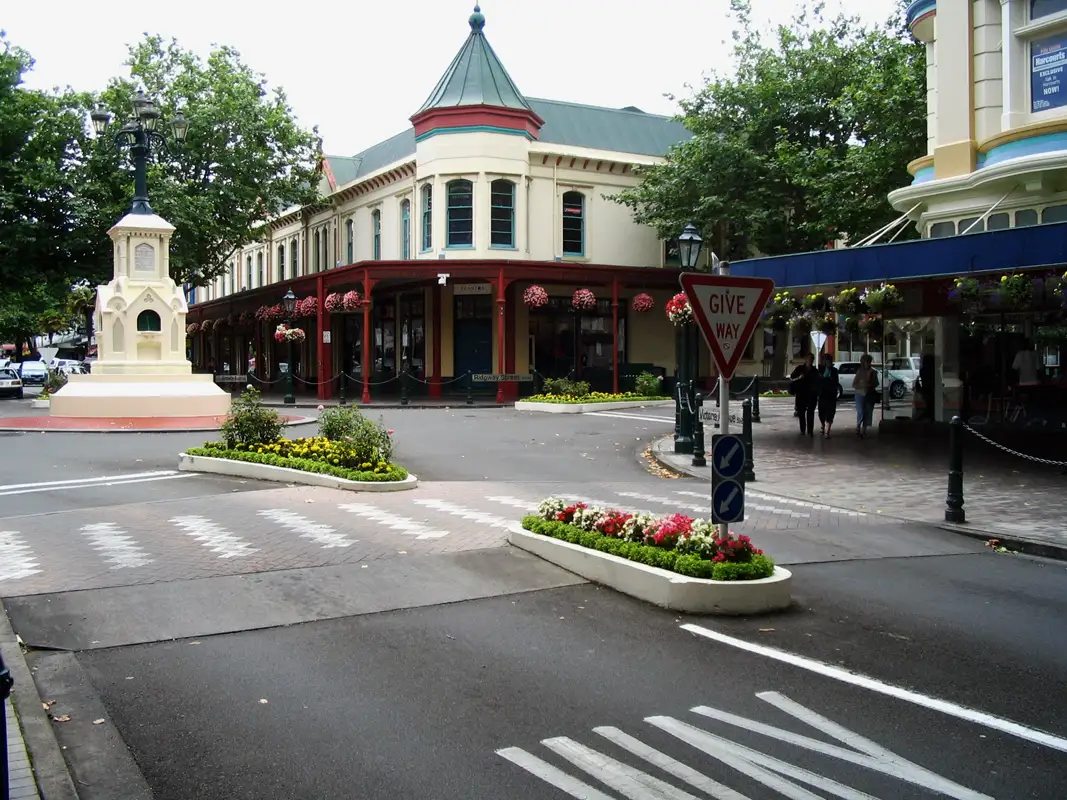
During our trips to New Zealand, we visited Whanganui twice. We went hiking and canoeing, played golf, walked along the mighty river and discovered the fantastic town centre.

The Whanganui River in New Zealand is very important to the Māori people. It was legally recognised as a person, with the same rights and responsibilities. This idea later inspired India to give similar rights to the Ganges River.
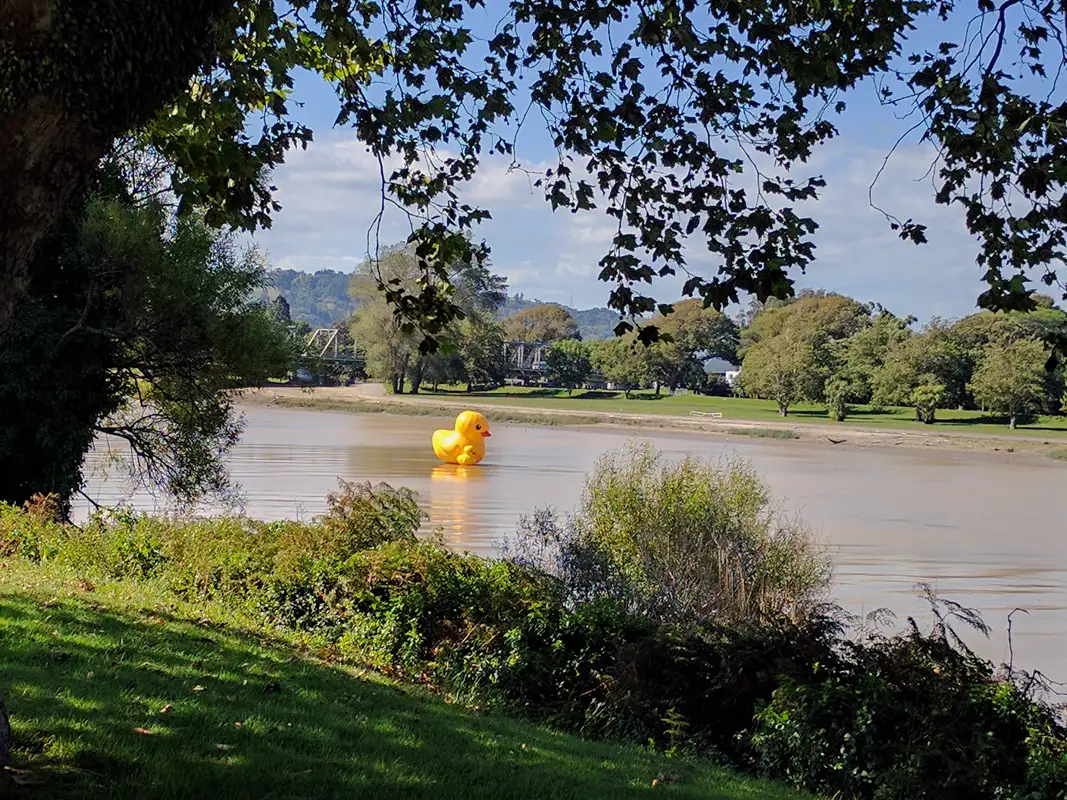
View of the Whanganui River and its unique fauna.
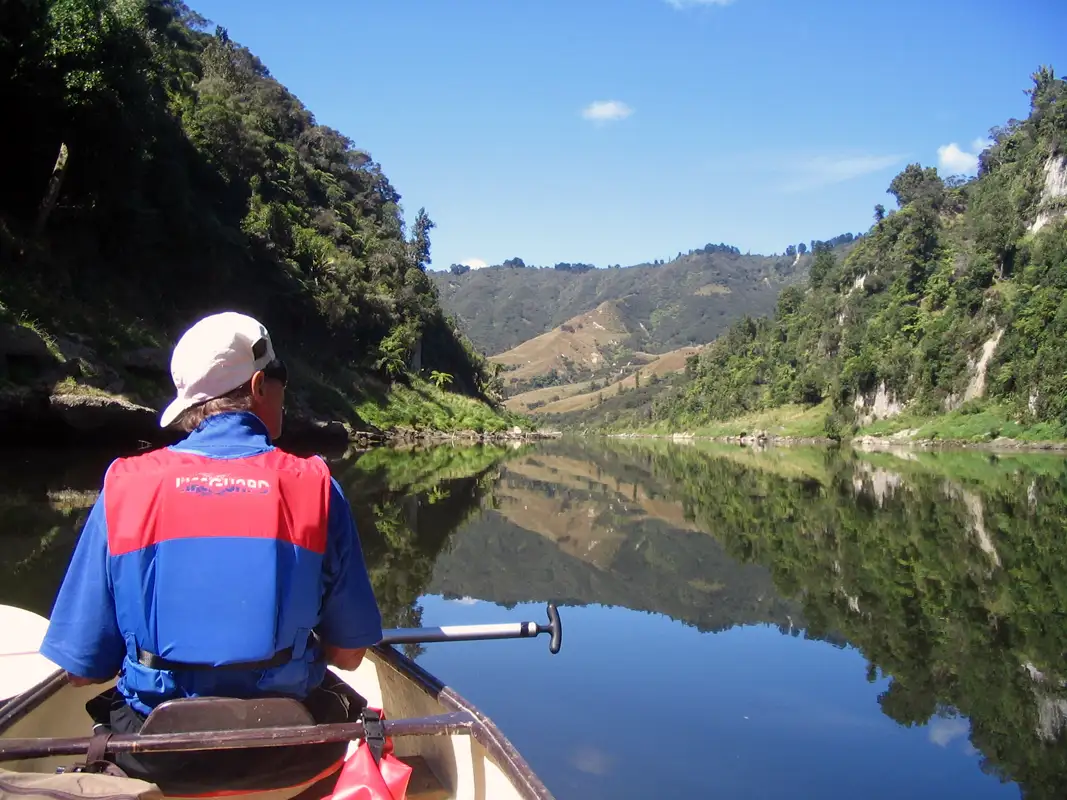
In 2007, we booked a canoe tour with the postman in Whanganui. As part of his mail run, he took us upriver to small, remote hamlets and dropped us off with a canoe. We paddled downstream for two wonderful hours, enjoying the tranquil beauty of the river, before he picked us up again. It was a unique and memorable experience.
Tongariro National Park
The Tongariro National Park is the oldest national park in New Zealand and has three active volcanic peaks. The park is great for hiking, climbing, and skiing. The park is a dual UNESCO World Heritage site for its Maori cultural and outstanding volcanic features.

Mount Ngauruhoe, 2,291 metres high, is New Zealand’s most active volcano, but it has been dormant for 50 years. This dangerous-looking volcano appeared as Mount Doom in the Lord of the Rings films. There is another volcano in New Zealand with a similar classic volcanic cone shape. This is Mount Taranaki near New Plymouth.

Mount Ruapehu is New Zealand’s largest active volcano, with multiple peaks. The highes which rises to 2,797 metres. In winter, it is a world-class ski destination, while in summer, it is a great place for hiking.
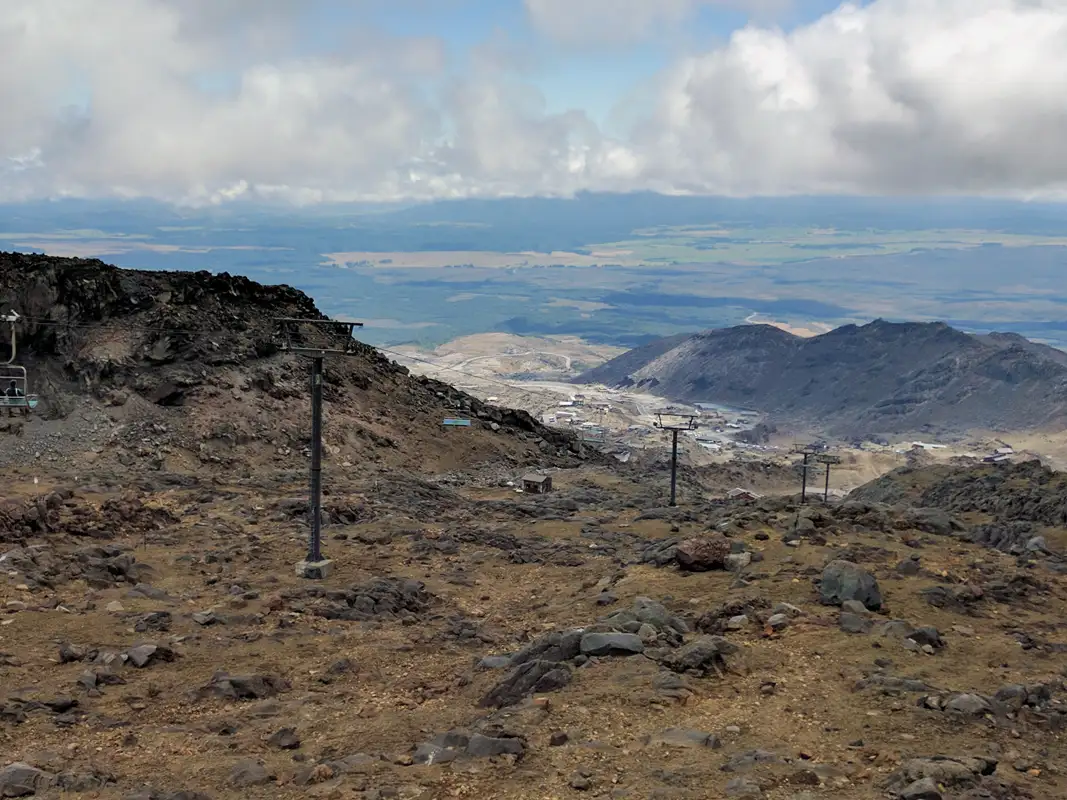
While we stayed in Ohakune, we took the lift from Whakapapa village to the Knoll Ridge Chalet, which is 2020 metres above sea level.
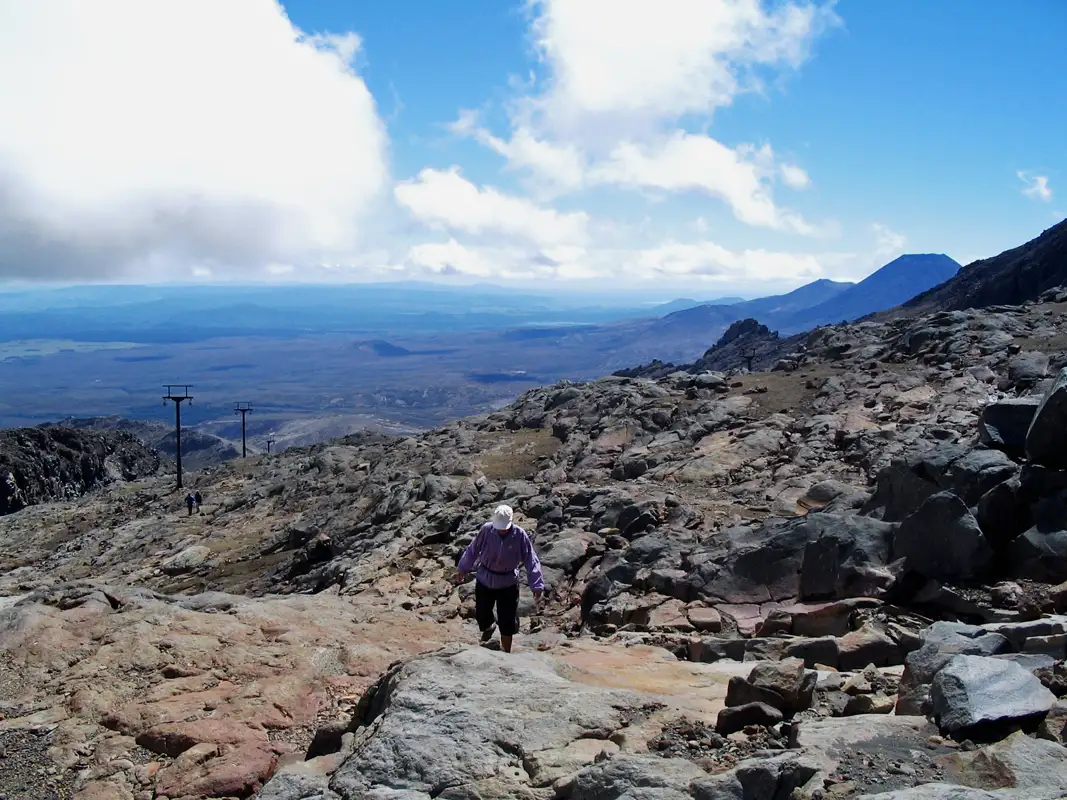
Later, we hiked up Skyline Ridge (2,300 metres) and enjoyed wonderful views of Mt Ngauruhoe and Lake Taupo. We loved this walk. Although it’s short, many consider it one of the best hikes in Tongariro National Park.

Finally, on our trip to Whakapapa, we stumbled upon a top-secret military storage site.Have a look and figure out what we found.

The Silica Rapids is our most loved hike in Whakapapa. Track starts 250 metres above the Visitor Centre. Then the path passes through subalpine vegetation, mountain beech trees, swamps, and tussock grass. Iron-oxide clays from upstream swamps create the famous Silica Rapids, creamy white. It took us two and a half hours to complete.
Taupo
Taupo is a picturesque town on the shores of Lake Taupo, New Zealand’s largest lake and is surrounded by hot springs. Its a paradise for outdoor lovers. Whether you’re trout fishing, hiking scenic trails, or enjoying water sports. It’s a must-visit place for any traveler to New Zealand.
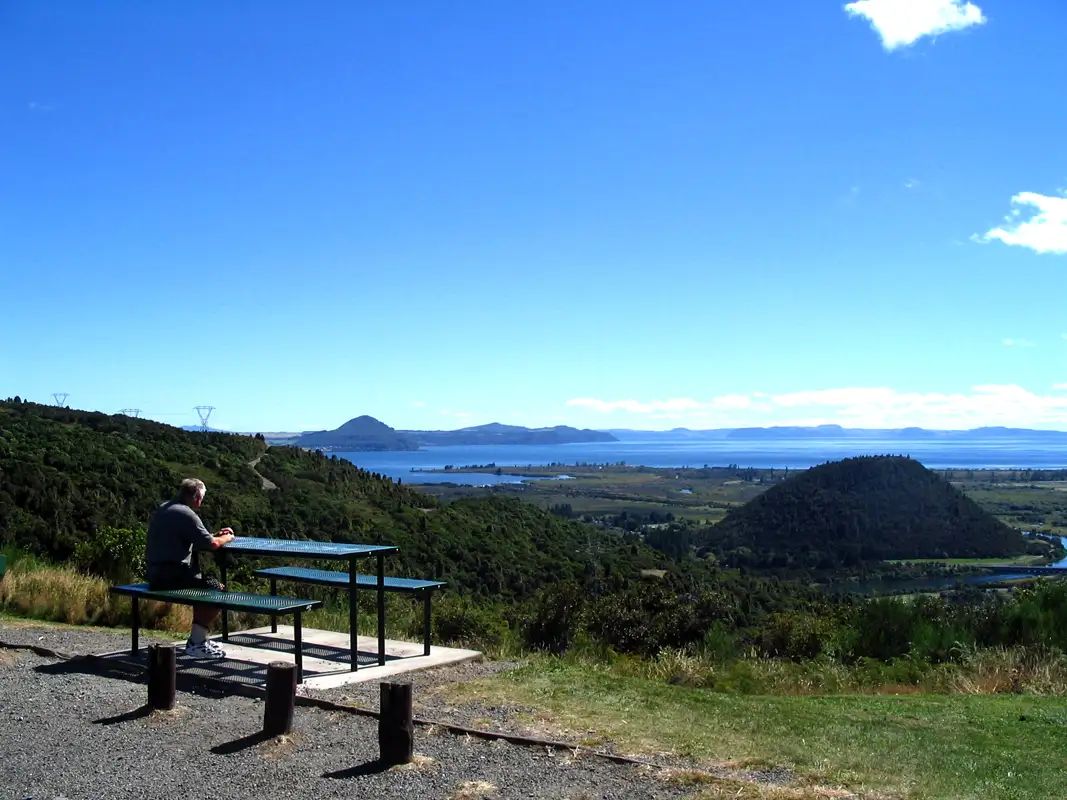
On the way to our next destination, we had a lunch break with great view of Lake Taupo. The lake was formed by a massive volcanic eruption. The lake is surrounded by stunning scenery, rolling hills and steaming hot springs. We stayed for a few days halfway between Taupo and Rotorua. This was the perfect base for exploring this fascinating region.
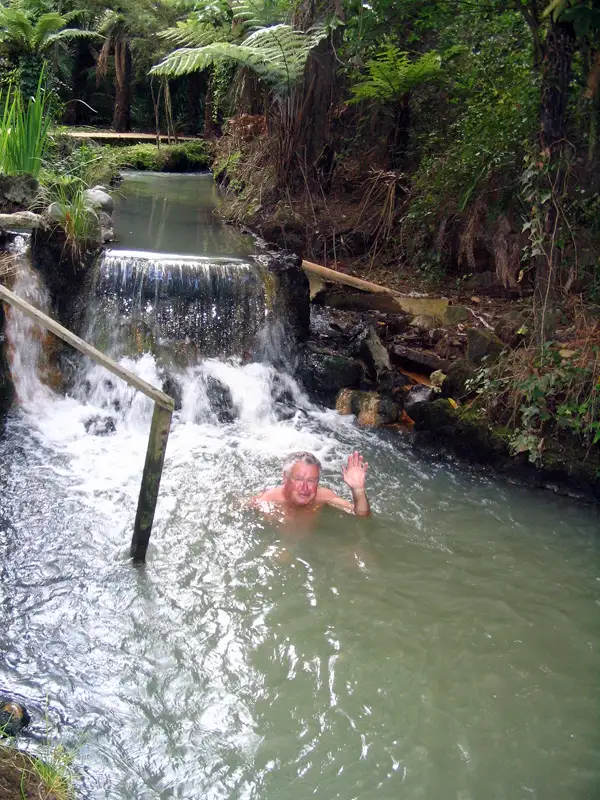
Our place was a bit run-down, but it had one big plus—our own private hot spring. During our travels in New Zealand and Australia, we visited many hot springs, but Berry Springs, near Darwin, was our favourite.
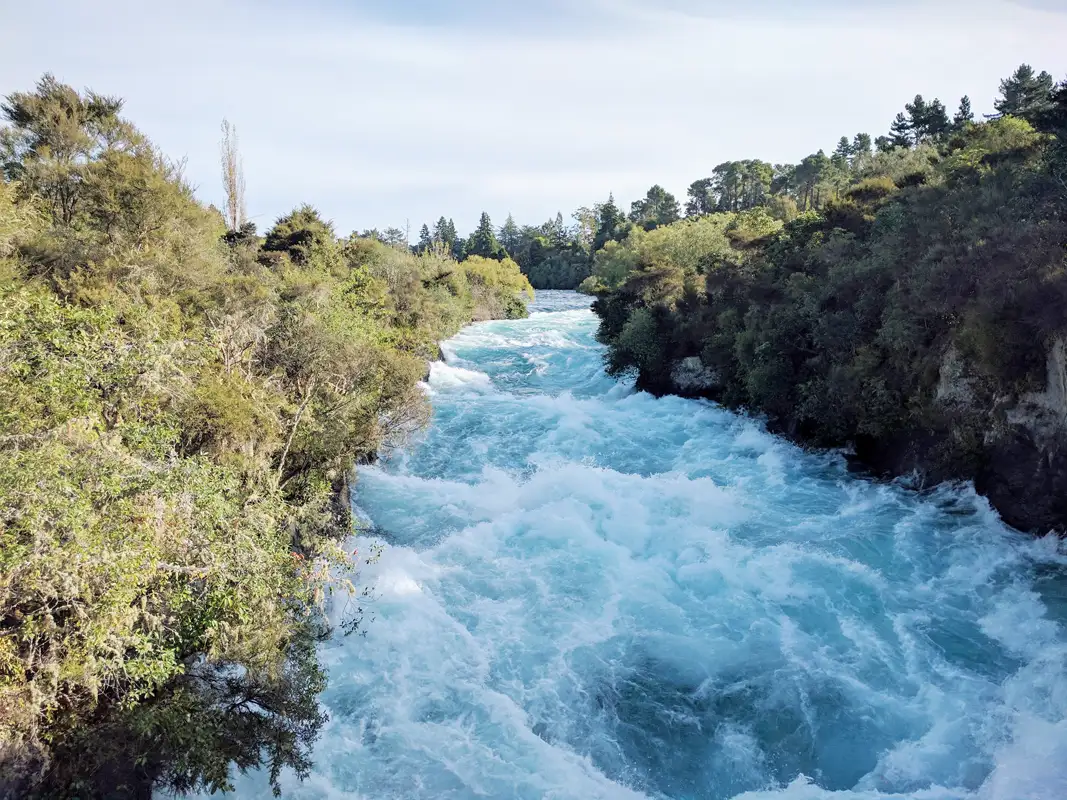
We have been there at least twice, the Huka Falls were always exciting. The massive water comes from New Zealand’s longest river, Waikato. It flows through Lake Taupo and then into a narrow rock chasm which create the Huka Falls.

We visited New Zealand many times and once considered a trip to White Island the most exciting tour we’d done. But then we did Whitewater Rafting from Turangi, that was the most thrilling adventure we did. It was a Grade 3 tour, with 2.5 action-packed hours on the water. Before setting off, we had to confirm our fitness and ability to follow paddle commands and safety instructions. No problem there—we are as fit as a 79-year-old can be!
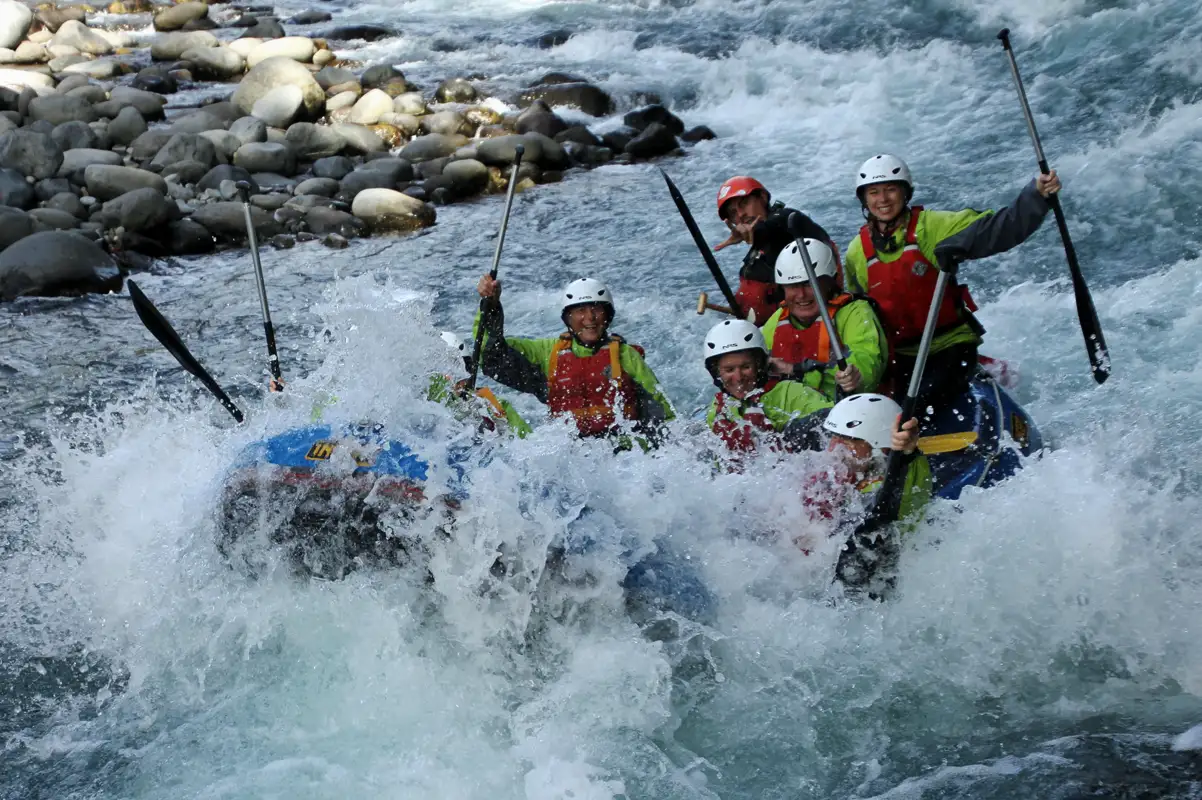
During our tour, we steered 60 rapids. We rafted a 13-kilometre of the river Our guide was fantastic steering us through the turbulence Whitewater. It was a great time, plenty of laughter, a few heart-pounding moments, and lots of fun. We still look back on this unforgettable adventure as it was the highlights of our trip.

Our crew was excellent some had even competed in an international triathlon just the day before. We felt quite proud to be part of a team with such fit people.
Rotorua
Rotorua is an exciting city with all the geothermal activity. We loved watching the geysers sending jets of water into the air and bubbling mud pools. We enjoyed going into the hot springs after a good hike. In addition there is a wonderful lake and great hiking trail. It also offers many ways to learn about the traditional Maori customs, arts, and lifestyles.
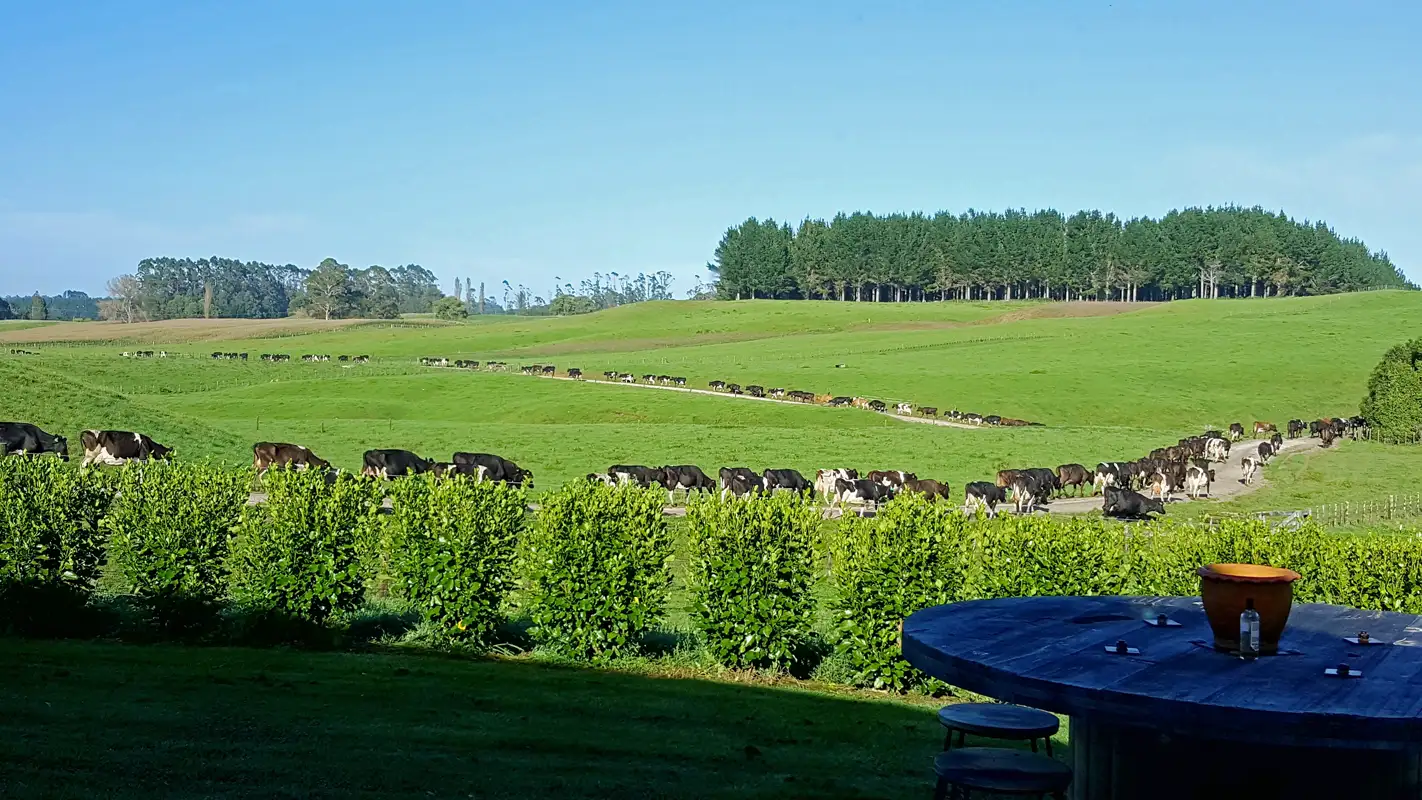
During one of our New Zealand trips, we stayed in a nice rental home a few kilometres outside of Rotorua. From there, we went hiking and played golf. The highlight of the day was when the cows walked in a long row to the milking station.

The Crater of the Moon is about one hour drive from Rotorua. It is a popular tourist destination with easy walkways and low admission fees. We have been there twice and loved it.

We drove to the Waimangu Volcanic Valley which is a 20 minutes drive from Rotorua. From the visitor centre, we walked down to the Frying Pan Lake, which took about 1 hour. It is the world’s largest hot spring and is filled with steaming acidic water, typically around 55 C to 60 C.

A bit further Waimangu Valley Walkis the stunning Inferno Crater Lake, it is a hot spring with stunning pale blue, highly acidic water. By the way, For visitors, who don’t want to walk the whole way, there is a shuttle bus which stops at three locations and returns to the entrance.
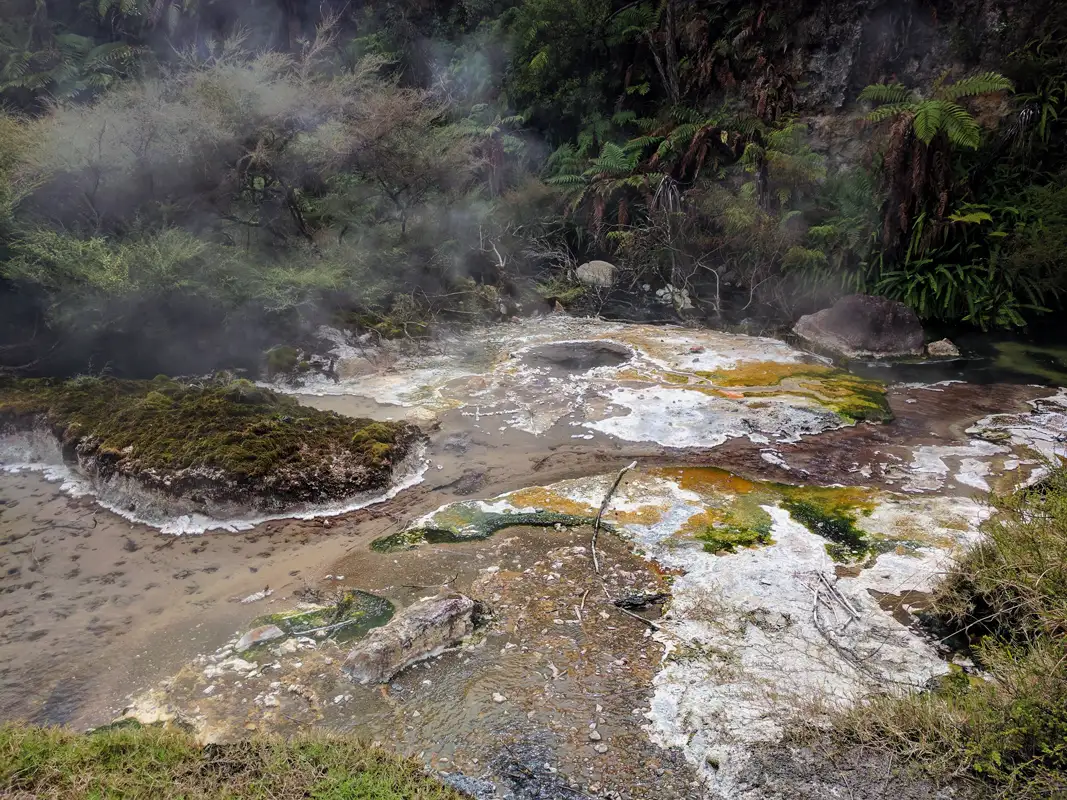
From the Frying Pan lake there is a little hot stream along the trail. The stream creates colourful places with water bubbles everywhere and a strong smell of sulfur.

View of the beautiful pink and white terraces. Formed by the hot stream, which cools down on the way to the lake. The silica crystalizes and are the white spots. The pink is created by the sulphides.
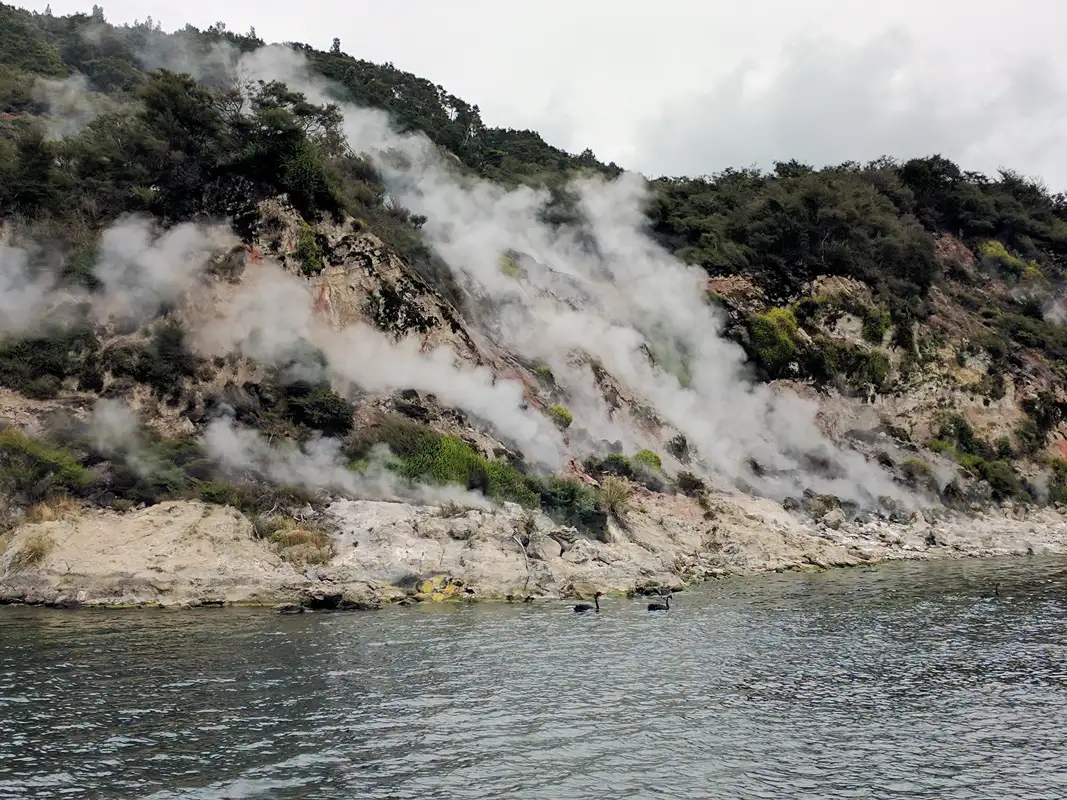
The end of our hike is Lake Rotomahana, one of New Zealand’s deepest lakes. On our second visit to the valley, we did a 45-minute cruise. The cruise went through an unspoilt wilderness area. After the cruise, a bus took us back to the Visitor Centre.
Whakaari/White Island
White Island is s New Zealand’s most active volcano. and is about 48 kilometres offshore from the North Island.However, a large eruption in 2019 killed 22 tourist and injured many other, and no tourists allowed on the island since then. Thankfully , we did the trip there in 2007, because now, we wouldn’t be allowed on the island.
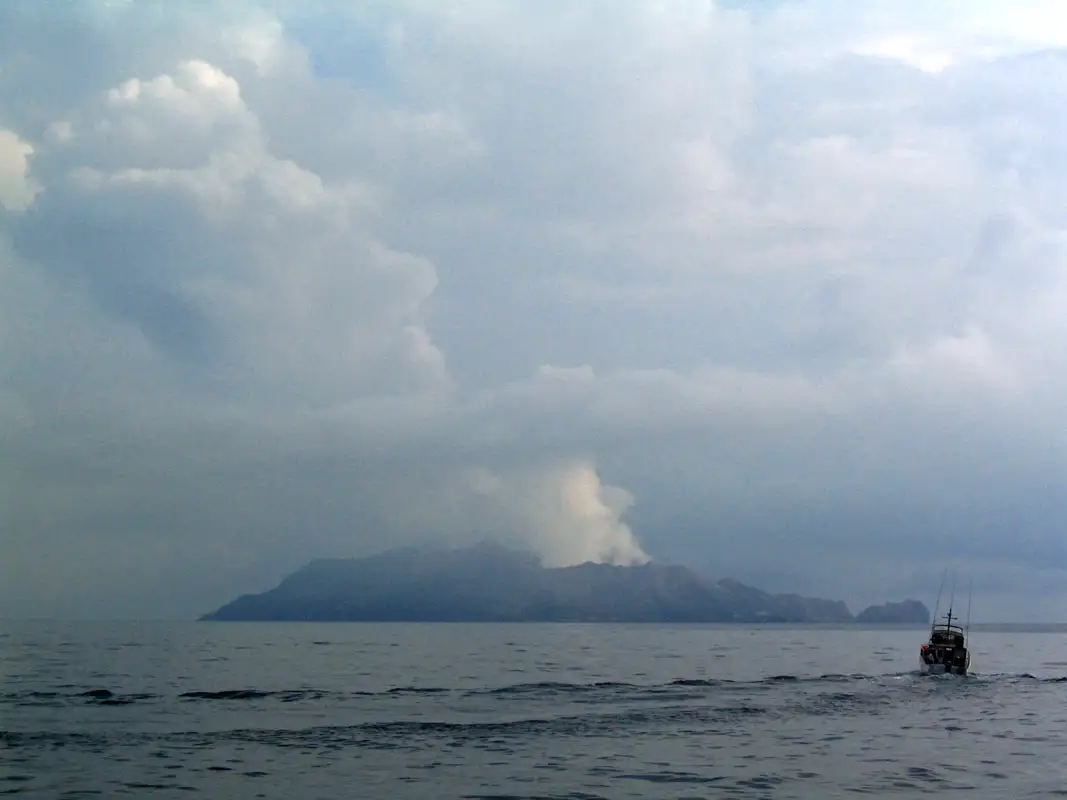
While touring New Zealand in 2007, we took a boat trip from Whakatane to Whakaari / White Island. It was an unique adventure.
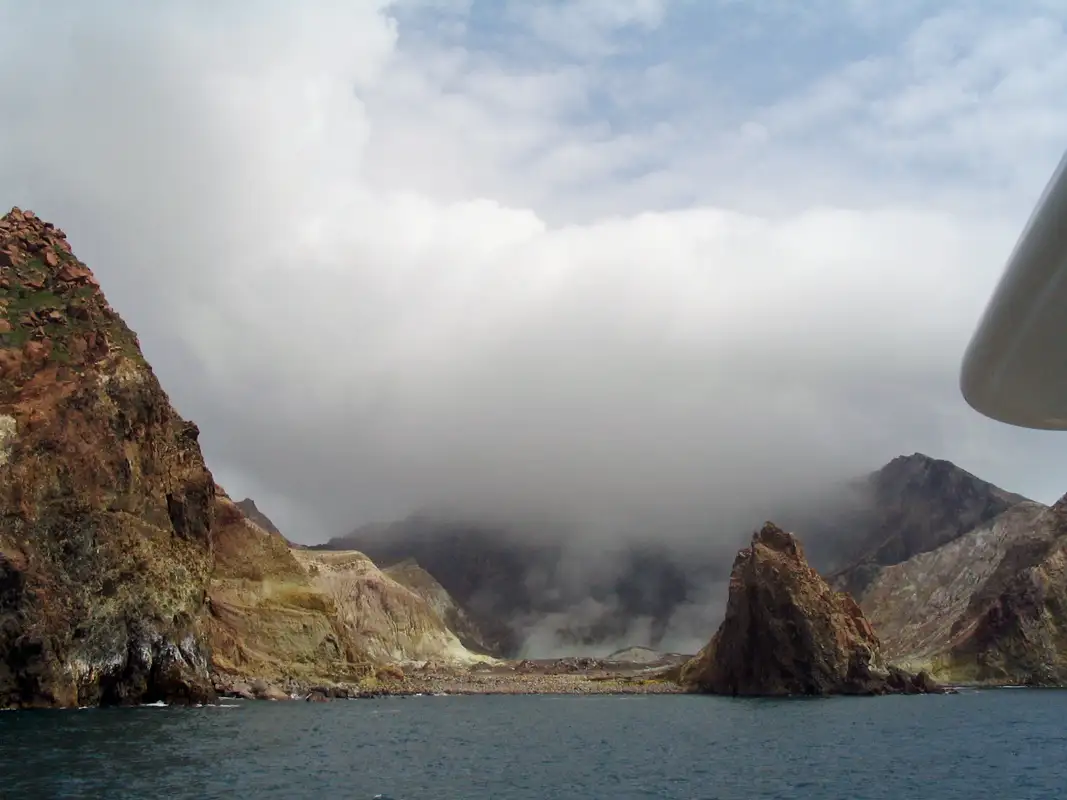
Helicopter tours to White Island are popular, but we enjoyed the two hours boat trip, one way. We had a wonderful guide. She told us interesting stories about the history of the Island and Whakatāne.
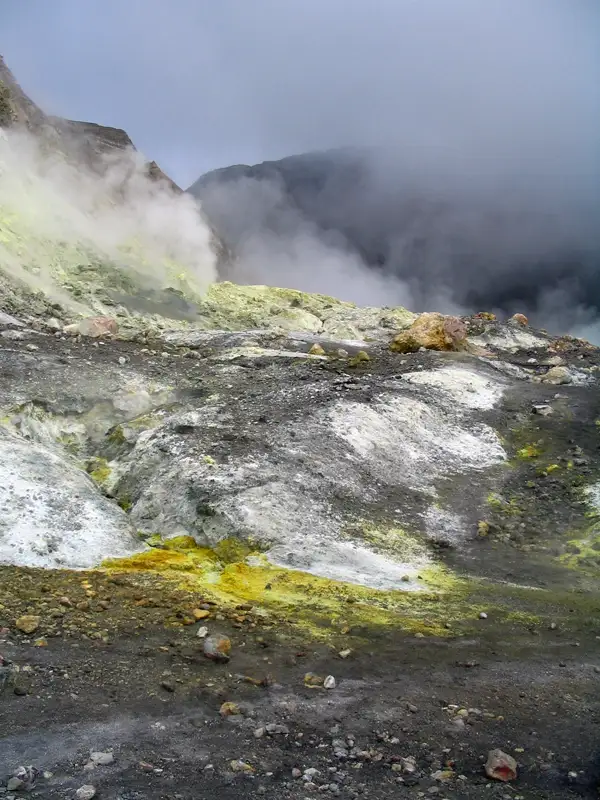
We took a two-hour guided tour around the island, and it was fascinating, with the colours, steam, and odour.
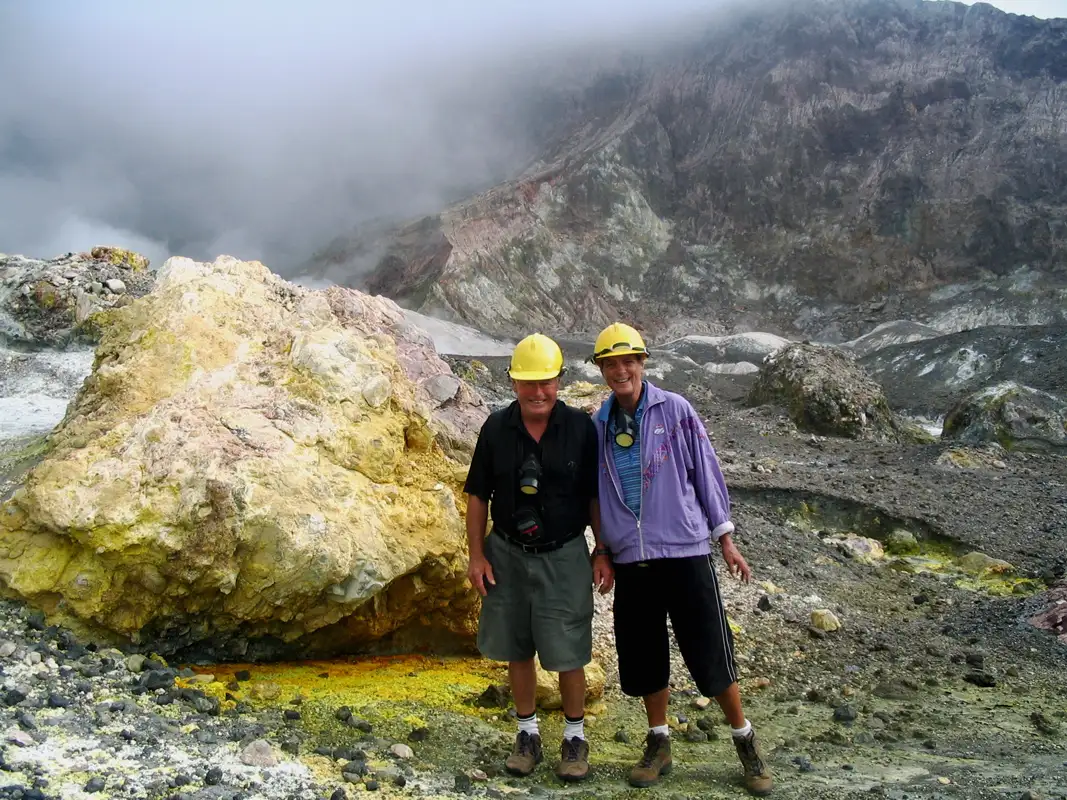
We had a great timer and were lucky that no volcano eruption happened while we were there.
Napier
Napier is located in the heart of Hawke’s Bay, is one of New Zealand’s premier wine regions. It is a vibrant city known for its stunning Art Deco architecture and beautiful coastal landscapes. Often referred to as the “Art Deco Capital of the World.

While Napier is known for Art Deco, it is also a major wine-producing region in Hawkes Bay. We walked the 3-kilometre along the black pebble beach it was beautiful. In Addition, there are also playgrounds, swimming pools and much more.

The earthquake in 1931 destroyed many beautiful buildings. The city was rebuilt to its former glory. Another stunning Art Deco, was built the Soundshell, was built in 1935.

This beautiful Art Deco built after the earthquake is the ASB bank building.

The Tom Parker is another masterpiece of Art Deo in Napier. It is one of the tourists favours because the fountain is lightning at night.
More from New Zealand: South Island